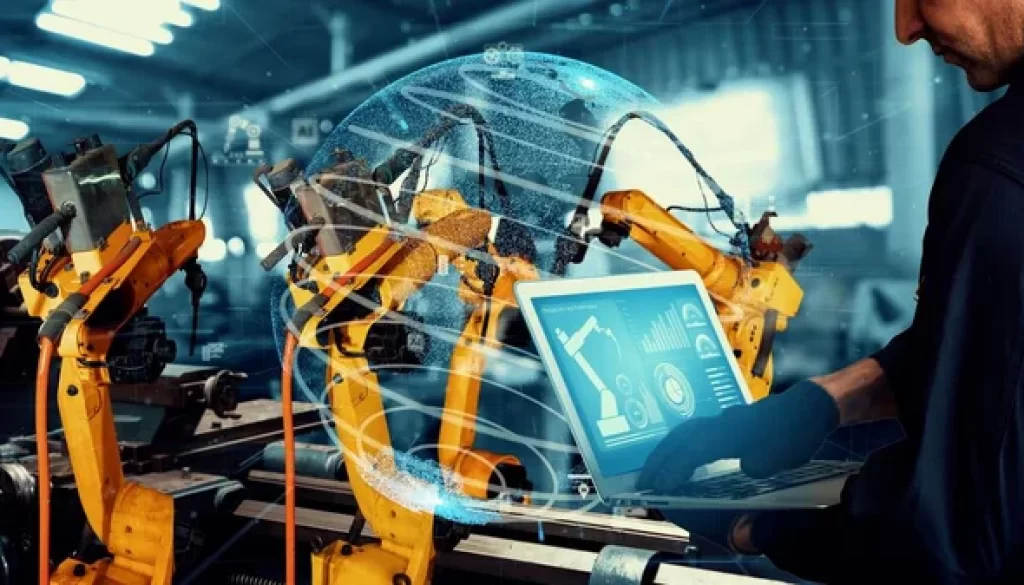Revolutionizing the Artificial Intelligence Industry: A Comprehensive Overview
Introduction
Artificial Intelligence (AI) has undeniably emerged as the transformative dynamism of the 21st century. In an epoch where technology serves as the catalyst for innovation, the AI realm distinguishes itself as a vanguard, crafting ripples across multifarious domains. We, as authorities in this domain, endeavor to furnish you with an insightful and all-encompassing compendium of the AI sector’s revolution, accentuating the latest advancements, applications, and forthcoming prospects. Let’s uncover Revolutionizing the Artificial Intelligence.
Understanding the AI Revolution
AI Redefining Industries
AI transcends the realm of mere nomenclature; it is refashioning sectors, engendering fresh potentialities, and optimizing efficiencies. From healthcare to finance, AI is deconceptualizing the modus operandi, lifestyle, and interaction with technology.
In the sphere of healthcare, for instance, AI is occupying a pivotal stance by enabling premature ailment identification and tailored therapeutic schemas, thereby safeguarding lives. AI’s prowess in dissecting extensive medical datasets bequeaths a level of precision that can engender transformative impacts. With AI, medical practitioners can proffer diagnoses of heightened accuracy, ushering in enhanced patient care.

The assimilation of AI into healthcare materializes as a remarkable transmutation. Radiology serves as a prime exemplar where AI has charted substantial progress. AI algorithms are equipped to dissect medical imagery, encompassing X-rays and MRIs, with precision that eclipses human capabilities. This not only expedites the diagnostic process but also curtails human fallibility. As AI continues its evolution, it is foreseen to assume a yet more critical role in diagnostics, expediting healthcare professionals in making swifter and more precise assessments.
The Data-Driven Revolution
The epicenter of AI lies enshrouded in data. The profuse reservoirs of data in existence today fuel AI’s process of erudition and adjudication. Machine learning algorithms dissect this data, deciphering intricate patterns, thus empowering AI frameworks to devise forecasts, tender recommendations, and even undertake the automation of tasks.
Data constitutes the life essence of AI. The a plenitude of data available in this age empowers AI systems to assimilate and evolve. Machine learning algorithms, which constitute the bedrock of AI’s data-driven metamorphosis, scrutinize this data to apprehend patterns, trends, and anomalies. These algorithms form the underpinnings of AI’s ability to extrapolate, offer counsel, and carry out functions hitherto reserved for humans.
The Role of Deep Learning
Deep learning, a facet of AI, has garnered remarkable attention in recent years. This technology emulates the neural networks of the human brain, conferring upon AI systems enhanced data processing and pattern recognition capabilities. It stands as the dynamic impetus behind myriad advancements in AI, encompassing image recognition, natural language processing, and autonomous systems.
Deep learning, an offshoot of AI, manifests as overwhelmingly potent. It simulates the neural networks of the human brain, endowing AI frameworks with superior data processing capabilities. This has catalyzed advancements in diverse domains:
Visual Identification: Deep learning has substantially advanced visual identification. AI systems now demonstrate acumen in recognizing entities, individuals, and even emotional cues within images, exhibiting astounding precision.
Linguistic Interpretation: AI-piloted chatbots and linguistic translation tools have reaped substantial advantages from deep learning. This enables these systems to grasp and respond to human language in a more innate fashion.
Self-Driven Systems: Autonomous automobiles and drones have graduated from being mere concepts to tangible realities, courtesy of deep learning. These systems are adept at traversing intricate terrains and executing real-time resolutions, consequently diminishing the dependence on human intervention.
Read about AI vs Human: Artificial Intelligence vs Human Intelligence: Unraveling the Advancements

AI Applications Across Industries
Healthcare: Saving Lives
In the healthcare domain, AI has etched resplendent achievements. From the timely detection of maladies to personalized therapeutic schemes, AI-based solutions are fundamentally augmenting patient outcomes. With AI’s incorporation, medical professionals are equipped to proffer diagnoses of greater precision and deliver superior patient care.
AI’s integration into healthcare is not confined to diagnostics. Among its most auspicious applications lies in pharmaceutical discovery and formulation. Pharmaceutical firms harness AI for the expeditious discovery and development of new drugs. Through the simulation of diverse compounds and their interactions, AI expedites the drug formulation process, potentially culminating in the salvation of lives.
Furthermore, AI’s application in healthcare transcends into the management of patient records, thus facilitating streamlined and precise record-keeping. This culminates in an enhancement of patient care and equips healthcare practitioners with immediate access to imperative information.
The Use of AI in Diagnostics
AI algorithms possess the competence to dissect medical images, be it X-rays or MRIs, with an acumen that outpaces human capabilities. This not only accelerates diagnostic procedures but also mitigates the prospects of human miscalculation.
Drug Discovery and Development
Pharmaceutical conglomerates resort to AI for the discovery and formulation of novel drugs in a more efficient manner. AI’s adeptness in emulating diverse compounds and their interplay expedites the drug innovation process, potentially transpiring as lifesaving in the long term.
Electronic Health Records
AI functions as a vital cog in the preservation and organization of electronic health records. This not only economizes time but also heightens the precision and availability of patient information.
Finance: Astute Investments
Financial institutions have eagerly embraced AI for the enhancement of customer experiences, the automation of trading, fraud detection, and risk management. AI-piloted chatbots offer instantaneous customer support, while algorithms engender data-informed investment decisions, optimizing portfolios for superior yields.
Within the financial terrain, AI is revolutionizing the approach to investment management. High-frequency trading, for instance, relies on AI algorithms that are competent in executing trades within microseconds. This swiftness eclipses the capacity of human traders and assumes a cardinal role in high-frequency trading, wherein every moment is precious.
The arena of risk management witnesses substantial AI influence. AI systems are adept in assessing and overseeing risk by sifting through extensive datasets. These systems are instrumental in anticipating potential risks and market trends, thus aiding financial institutions in crafting data-informed decisions, safeguarding their investments, and bolstering market stability.
High-Frequency Trading
AI algorithms are capable of executing trades within microseconds, exhibiting responsiveness to market oscillations that eclipses any human trader. This assumes paramount importance in high-frequency trading, where every fraction of a second is pivotal.
Risk Management
AI serves as a pivotal element in the evaluation and oversight of risk. It can scrutinize extensive datasets to prognosticate potential risks and market trends, thus assisting financial institutions in formulating well-informed decisions.
Education: Personalized Learning
AI is effecting a transformation in education by furnishing bespoke learning experiences. Adaptive learning platforms scrutinize the strengths and limitations of students, modulating content to cater to individual exigencies, culminating in heightened engagement and enhanced academic outcomes.
In the educational realm, AI customizes the learning process. Adaptive learning platforms employ AI to perpetually gauge a student’s performance and adapt the curriculum in real-time. This ensures that students receive an apt level of challenge and succor, which eventually leads to amplified academic results.
Moreover, AI’s sway in education transcends mere customization; it plays a substantial part in the identification and remediation of learning impediments. By scrutinizing student interactions with educational materials, AI can unearth patterns indicative of learning challenges, thereby facilitating suitable interventions. This ensures an equal prospect for every student to achieve success.
Adaptive Learning Technologies

These technologies perpetually assess a student’s performance and tweak the curriculum in real-time. This guarantees that students receive the right quantum of challenge and support, ultimately resulting in superior scholastic outcomes.
Addressing Learning Disabilities
AI has simplified the process of identifying and mitigating learning difficulties. By dissecting students’ interactions with educational resources, AI is proficient in identifying patterns indicative of learning challenges, hence extending a helping hand to every student, irrespective of impediments.
E-commerce: Enhanced Shopping
Online retailers are harnessing AI to deliver individualized recommendations, augmenting the shopping experience’s pleasure and efficiency. Chatbots furnish instant customer support, while AI algorithms furnish businesses with an insight into customer inclinations, leading to the creation of superior product assortments.
In the sphere of e-commerce, AI is reshaping the manner in which we engage in online shopping. The practice of using AI for personalized product recommendations has transitioned from being novel to commonplace. By scrutinizing a customer’s browsing history and purchasing patterns, AI is proficient in proposing products that align with their predilections. This not only enriches the shopping experience but also results in elevated conversion rates for businesses.
Customer support too has derived benefit from AI’s involvement. AI-driven chatbots remain at the ready around the clock to address customer queries and extend support. They are versatile in undertaking a broad array of functions, from monitoring order status to addressing frequently posed questions, culminating in an all-encompassing enhancement of the shopping experience.
Personalized Product Recommendations
By scrutinizing a customer’s browsing history and purchase patterns, AI is adept in recommending products aligned with their preferences. This not only elevates the shopping experience but also fosters a hike in conversion rates for businesses.
Chatbots and Customer Support
AI-driven chatbots remain accessible around the clock, proffering responses to customer queries and furnishing assistance. Their flexibility enables them to undertake an extensive array of tasks, spanning the tracking of orders to responding to frequently posed questions, thus augmenting the holistic shopping experience.
Transportation: Safer Roads
The transportation domain stands at the precipice of transformation, and this change can be attributed to AI. Self-driving vehicles, predictive maintenance, and traffic management systems are rendering roads more secure and transportation more efficient. AI’s capacity to process extensive data instantaneously has proven to be a game-changer within this sector.
The integration of AI into transportation is engendering a substantial amelioration in security. Self-driving vehicles, propelled by AI algorithms, can perceive their surroundings, craft instantaneous resolutions, and navigate securely. This technological innovation has the potential to diminish accidents resulting from human fallibility, thus revising the conventional notions of personal and communal transportation.
Furthermore, AI is being instrumental in the sphere of predictive maintenance within the transportation sector. AI systems can predict when conveyances and infrastructural elements, such as bridges and roadways, necessitate maintenance. This proactive approach can conserve time and resources while simultaneously boosting security.
Self-Driving Cars
The emergence of self-operated vehicles is one of the most exhilarating strides within the transportation sector. AI algorithms within these vehicles can sense their milieu, forge instantaneous decisions, and navigate securely, potentially decreasing accidents prompted by human miscalculations.
Predictive Maintenance
AI is instrumental in the foresight of maintenance requirements for vehicles and infrastructure, be it bridges or roads. This forward-thinking methodology can conserve time and resources while concurrently elevating security.
AI and the Future
The Power of Predictive Analytics

Predictive analytics, underpinned by AI, is slated to occupy a pivotal stance in shaping the future. Businesses shall lean on predictive analytics for data-based decisions, governments will exploit it in policy formulation, and healthcare providers shall employ it to forewarn disease outbreaks. The future shall bear the hallmark of data-driven methodologies.
Predictive analytics, a sphere empowered by AI, is on the cusp of revolutionizing the decision-making process. Businesses shall bank on predictive analytics to premeditate market inclinations and consumer behaviors. This information holds immeasurable value in sustaining a competitive edge within a dynamic market.
Governments too are embracing predictive analytics for informed policy formulation. By dissecting massive datasets, they can formulate data-informed judgments that serve the interests of their constituents. Additionally, in healthcare, predictive analytics is being utilized to forewarn disease outbreaks and detect populations at risk, thus allowing for more proactively efficient healthcare interventions.
Predictive Policing
Law enforcement agencies are embracing AI-driven predictive analytics to detect potential crime hotspots. This empowers them to allocate resources more effectively, thereby diminishing crime rates in specific areas.
Personalized Healthcare
In the impending future, healthcare shall be tailor-fitted to an individual’s genetic configuration, lifestyle, and environmental factors. AI-driven predictive analytics shall assist in diagnosing illnesses prior to symptomatic manifestations and suggesting personalized therapeutic blueprints.
AI in Space Exploration
AI is leaving indelible footprints in cosmic exploration. Autonomous rovers and drones are embarking on planetary sojourns, scrutinizing data, and dispatching invaluable insights back to Earth. AI’s aptitude for operation in desolate, remote surroundings opens up a plethora of opportunities in our quest for comprehending the cosmos.
In the sphere of cosmic exploration, AI is unfurling new horizons. Autonomous rovers such as NASA’s Curiosity and Perseverance are endowed with AI systems that empower them to navigate and forge decisions autonomously. These rovers have unearthed groundbreaking discoveries, further enriching our knowledge of the Crimson Planet and paving the way for prospective human sojourns to Mars.
AI is also refining space telescopes like the Hubble Space Telescope. By automating data scrutiny, AI can expeditiously identify celestial entities and occurrences. This equips astronomers to dedicate their energies to pioneering investigations and unraveling the enigmas of the cosmos.
Mars Rovers
NASA’s Mars rovers, including Curiosity and Perseverance, are kitted with AI systems that enable autonomous navigation and decision-making, enriching our comprehension of the Red Planet.
Space Telescopes
AI is similarly enhancing celestial observatories like the Hubble Space Telescope. Through automated data analysis, AI can promptly pinpoint celestial entities and phenomena, empowering astronomers to focus on pioneering research.
Ethical Considerations
As AI permeates our existence to a heightened degree, concerns apropos ethical considerations and AI’s influence on society assume prominence. We, as trailblazers within the industry, recognize the significance of ethical concerns. Ensuring the responsible and ethical use of AI is indispensable for its enduring prosperity.
The ethical concerns shrouding AI are pivotal. As AI frameworks integrate more profoundly into society, they can unwittingly perpetuate prejudices inherent in their training data. The correction of these biases and the establishment of fairness and impartiality within AI systems stand as imminent imperatives. We must ensure that AI technologies evolve and are wielded in a manner that reveres the foundational principles of impartiality and fairness.
Additionally, apprehensions concerning privacy occupy the forefront as AI systems navigate extensive personal data. Striking a balance between employing this data for constructive purposes and respecting individual privacy represents a societal challenge that warrants meticulous consideration. Stringent data protection and privacy measures constitute essentials in upholding faith in AI systems.
The perpetuation of transparency and responsibility in AI decision-making is likewise paramount. As AI systems embrace a greater degree of autonomy, understanding the method by which they arrive at conclusions and holding them accountable for their actions becomes quintessential. The establishment of ethical frameworks and regulations holds pivotal relevance in accomplishing these objectives.
The Road Ahead
The AI sector is advancing at an unparalleled pace. It is a thrilling expedition into the future, where innovation remains unconstrained. We are steadfast in our commitment to being at the forefront of AI advancements, furnishing you with sage insights and solutions.
The road ahead unfurls an array of limitless potentialities as the AI sector continues its evolution. We, as specialists in this realm, stand resolute in our dedication to keeping you abreast of the most recent advancements and solutions. The AI revolution is indubitably a steadfast presence, and we extend an invitation to you to embrace it alongside us. Together, we shall expand the horizons of innovation and influence transformative change.

In Conclusion to Revolutionizing the Artificial Intelligence
In summation, the AI revolution is firmly embedded, and we are here to facilitate your progression through it. Embrace the forthcoming with AI, and in unison, we shall persist in expanding the frontiers of innovation and reshaping the globe.
The AI industry is extensive and in perpetual flux. It has ushered in transformations across numerous sectors, encompassing healthcare, finance, education, e-commerce, and transportation. In healthcare, AI distinguishes itself by preserving lives through timely ailment detection and tailored treatment regimes. The financial sector enjoys the dividends of AI’s astute investments and risk management. In the field of education, tailored learning experiences yield improved outcomes, and e-commerce enhances shopping with personalized recommendations and efficient customer support. Transportation is becoming more secure, courtesy of self-driving cars and predictive maintenance.
Looking into the horizon, predictive analytics underpinned by AI will play a pivotal role in informed decision-making across a multitude of sectors. AI’s contribution to space exploration is conspicuous in autonomous rovers and space telescopes. However, ethical considerations regarding AI’s societal impact, bias, and privacy demand careful attention.

The path forward is laden with an assortment of prospects as the AI industry evolves relentlessly. We, as authorities in this sphere, remain steadfast in our commitment to keeping you abreast of the latest developments and solutions. The AI revolution is indubitably here to stay, and we cordially invite you to embrace it alongside us. Collectively, we shall extend the frontiers of innovation and redefine the world.
Additional Links
- Revolutionizing Industries: The Rise of AI in 2023
- The Rise of Artificial Intelligence: How AI is Revolutionizing …
- Artificial Intelligence in the Tech Industry: Revolutionizing …
FAQs
1. What is Artificial Intelligence (AI)?
- Artificial Intelligence, or AI, refers to the simulation of human intelligence in machines that can perform tasks typically requiring human intelligence, such as visual perception, speech recognition, decision-making, and problem-solving.
2. How is AI transforming healthcare?
- AI is making a significant impact on healthcare by enabling early disease detection, personalizing treatment plans, and improving the accuracy of medical diagnoses. It enhances patient care and saves lives.
3. What role does AI play in the financial sector?
- AI is revolutionizing finance by automating trading, detecting fraud, and optimizing investment portfolios. High-frequency trading and risk management benefit from AI’s speed and data analysis capabilities.
4. How does AI improve education?
- AI enhances education through personalized learning experiences. Adaptive learning platforms analyze student performance and tailor content to individual needs. It also aids in addressing learning disabilities more effectively.
5. In what ways is AI revolutionizing e-commerce?
- AI in e-commerce provides personalized product recommendations and instant customer support through chatbots. It helps businesses understand customer preferences and improve product offerings.
6. How does AI contribute to safer transportation?
- Self-driving cars, predictive maintenance, and traffic management systems powered by AI make transportation safer and more efficient. AI’s real-time data processing capabilities play a crucial role in this sector.
7. What is predictive analytics, and how does AI enable it?
- Predictive analytics involves using data to make informed predictions and decisions. AI plays a pivotal role by analyzing vast datasets, helping businesses, governments, and healthcare providers anticipate trends and outcomes.
8. What are the ethical considerations in AI?
- Ethical considerations include addressing bias in AI, protecting individual privacy, and ensuring transparency and accountability in AI decision-making. It’s essential to use AI responsibly and ethically.
9. How is AI advancing space exploration?
- AI enables autonomous rovers and space telescopes to explore planets and analyze celestial phenomena. AI’s ability to operate in remote environments enhances our understanding of the universe.
10. What’s next for the AI industry?
- The AI industry continues to evolve rapidly. The future promises even more innovative applications across various sectors, along with a focus on ethical AI development and usage.
MCQs
1. What is the primary role of AI in healthcare?
- A) Providing financial services
- B) Enhancing customer support
- C) Enabling early disease detection
- D) Enhancing e-commerce sales
Answer: C) Enabling early disease detection
2. In which sector does AI play a crucial role in assessing and managing risk?
- A) Education
- B) Finance
- C) E-commerce
- D) Transportation
Answer: B) Finance
3. How does AI improve education?
- A) By providing personalized shopping experiences
- B) By automating transportation systems
- C) By enhancing customer support
- D) By offering personalized learning experiences
Answer: D) By offering personalized learning experiences
4. What is one of the significant applications of AI in e-commerce?
- A) Personalized product recommendations
- B) Predictive policing
- C) Autonomous rovers
- D) Space exploration
Answer: A) Personalized product recommendations
5. How is AI making transportation safer?
- A) By analyzing celestial phenomena
- B) By providing personalized shopping experiences
- C) Through self-driving cars and predictive maintenance
- D) By enabling early disease detection
Answer: C) Through self-driving cars and predictive maintenance
6. What is the primary purpose of predictive analytics driven by AI?
- A) Enhancing customer support
- B) Identifying learning disabilities
- C) Making informed predictions and decisions
- D) Offering personalized product recommendations
Answer: C) Making informed predictions and decisions
7. What are some ethical considerations in AI?
- A) Predicting future trends
- B) Addressing bias in AI, ensuring privacy, and maintaining transparency and accountability
- C) Enhancing customer support
- D) Analyzing celestial phenomena
Answer: B) Addressing bias in AI, ensuring privacy, and maintaining transparency and accountability
8. How is AI contributing to space exploration?
- A) By offering personalized learning experiences
- B) Through predictive maintenance
- C) By enabling autonomous rovers and enhancing space telescopes
- D) By automating trading
Answer: C) By enabling autonomous rovers and enhancing space telescopes
9. What’s the focus for the future of the AI industry?
- A) Providing instant customer support
- B) Enhancing e-commerce sales
- C) Developing ethical AI and innovative applications
- D) Predicting future trends
Answer: C) Developing ethical AI and innovative applications



